When I moved from the UK to Spain after my PhD, I found myself in a lab of two more team members. While I just started speaking Spanish, only one of my lab mates spoke good English for us to properly communicate. Unfortunately, he also left just two months after I arrived in the lab.
The institute that I now worked at was rather small. And the majority of people from other groups had their families waiting for them to come home after work. Regular social gatherings that I was used to from my previous institute were non-existent at this place, so it was incredibly difficult for me to connect with any of my co-workers.
This lonely and difficult period made me realise just how important relationships are to me. Throughout my life, I moved cities many times but never did I have such difficulties in connecting with others and making new friends.
The importance of communication and relationships in the scientific community
So, what was the issue? I am convinced that it was the language barrier and the resulting lack of communication. We know that communication is the basis for relationship-building and in my case, it was completely absent.
Interestingly, the recent 85-year-long Harvard study on happiness found that the number 1 feature of happy people is quality relationships. They found that the most satisfied, healthy and fit people at any age had strong community networks, marriages or circle of friends. I can truly back that.
Moving labs, cities or even countries is rather common in the scientific community. This is why I think we, as scientists, should pay more attention to communication and relationship-building for our emotional well-being, productivity and health.
Note that as scientists, we are fundamentally also communicators. Researchers, academics, lab technicians and professors all communicate not only to exchange ideas and knowledge but also to promote collaboration and innovation. Developing strong connections and open lines of communication are key aspects for several scientific endeavours, for example:
Productive collaboration
Collaboration is an essential aspect of scientific progress. However, productive collaboration also requires open and honest communication about the results and data from experiments. Collaboration further encourages establishing diverse ideas and solving problems, enabling researchers to make significant breakthroughs and get to solutions faster and more efficiently.
Accelerated innovation
When scientists from different disciplines communicate and share their findings, it sparks curiosity and innovation. The cross-pollination of ideas and expertise can lead to ground-breaking discoveries and advancements in various non-connected scientific fields.
Validation and peer review
Peer review of scientific publications or grant applications relies on honest and critical communication. Within the scientific community, validation of research findings is necessary for knowledge to be accepted across fields, while constructive criticism ensures accuracy and reliability.
Professional development and mentoring
By nurturing relationships with scientists at different career stages, researchers can gain valuable insights and experiences, helping them grow professionally. Mentoring and guidance from seasoned experts and supervisors can provide scientists with new perspectives and expert advice.
Access to resources
A strong network within a scientific community opens up opportunities to gain access to resources such as funding, advanced equipment and specialized knowledge. Researchers can leverage these resources to conduct otherwise impossible experiments and further scientific investigations.
Effective communication in the science community
Knowing that several types of relationships exist within the scientific community, let’s have a closer look at how to build them. Relationship building mainly relies on communication to share common values, experiences and goals. Only then do we start to trust someone, rely on their words and consider them valuable partners.
Hence, open and effective communication is key to establishing and maintaining strong relationships within the scientific community. Here are some strategies you can apply to enhance your communication:
Clear and concise communication
Science communication guidelines demand you to communicate your research findings and ideas clearly and concisely. Using precise language, avoiding jargon, considering your target audience and organizing the information logically enables others to understand and engage with your research more effectively.
Active listening
Active listening is a crucial component of communication in all areas of life. When engaging in discussions or attending scientific presentations, listen attentively without judging what is being said and wait for the presenter to finish their speech. Only then give the said content thought and formulate your questions.
If you start thinking while the other person is still talking, you will not pay attention to what else is being said. Hence, active listening fosters both understanding and sharing different perspectives.
Collaboration platforms and tools
Technological advancements have made scientific collaborations and asynchronous communication easier than ever before. Scientists can use online platforms, such as shared project management tools, video conferencing software and document-sharing platforms to collaborate globally. These digital scientific tools promote efficient communication and enable scientists from different geographical locations to work together seamlessly.
Participating in scientific conferences and workshops
One thing I truly miss about being a lab-based scientist is going to conferences and sharing and discussing my research with other experts from the field. As such, presenting at scientific conferences and workshops is an excellent way for you to connect with peers and stay updated with the latest research.
Yes, especially at the beginning of your scientific career, talking in front of seasoned experts can seem quite scary. But it is completely worth it as these events provide endless opportunities for networking, sharing insights and building professional relationships.
Get started in science communication
As a researcher, your goal should be to share your research with anyone interested in it. Yes, this might entail other scientists and experts from the field. But there are also many people who are truly interested in science without having a scientific background. Hence, you could consider connecting with them on social media platforms, by writing blog posts or through volunteering opportunities for professional associations. Gladly, many learning platforms exist that help you improve your science communication skills.
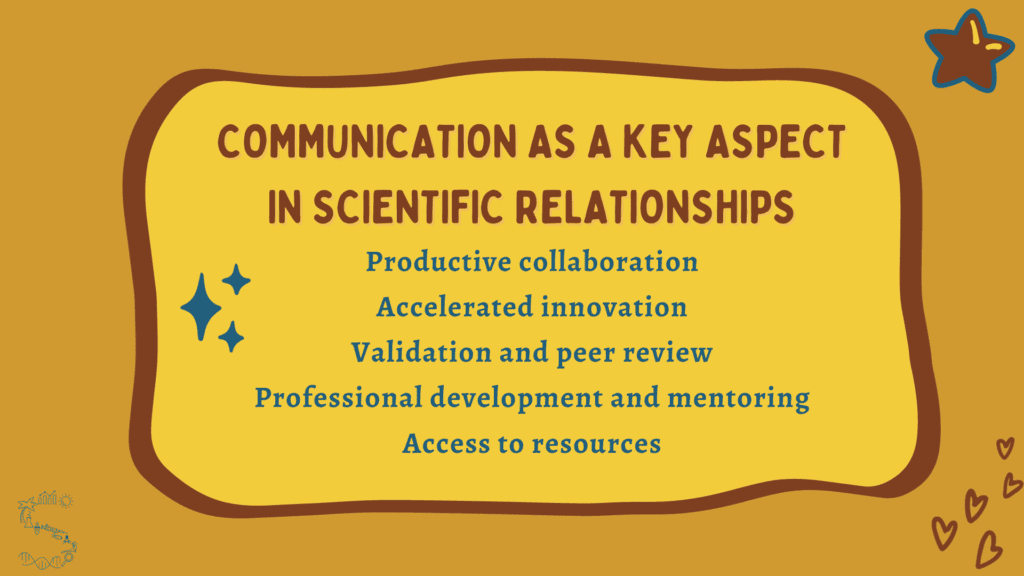
Building relationships in the scientific community
As we have seen, developing and nurturing relationships is vital for scientists and scientific advancement. To build strong connections within the scientific community, consider some of these strategies:
Networking
Attending networking events, joining professional societies and actively engaging in scientific discussions on online platforms can help you expand your professional network. Professional social media platforms are excellent ways to stay in contact with previous lab members and to connect with like-minded individuals and potential collaborators.
But don’t forget the off-line world: Regular social activities within the lab or institute massively help strengthen the ties among lab members. Many lab disputes were solved over a chilled beer.
Collaborative projects
Engaging in collaborative projects provides an opportunity to build relationships with other researchers who share similar research interests. By working together towards a common goal, scientists can establish lasting connections and forge strong relationships. Global collaborations are even more interesting since lab visits allow you to learn about new locations, cultures, languages and work environments. These experiences help you grow as a person and open your mind to new experiences.
Mentoring and collaboration across career stages
Scientists at different stages of their careers can benefit from mentoring. Establishing mentoring relationships with experienced researchers can provide you with guidance and support on topics that will become relevant to you. On the contrary, mentoring early-career scientists can foster peer learning, knowledge sharing and mutual growth.
Contributing to the scientific community
Actively participating in scientific communities helps you establish yourself as a scientist and accelerate scientific progress. By writing blog posts, attending conferences and publishing research articles, you can make valuable contributions to the field, which further attracts like-minded individuals and establish connections with peers.
Recognizing and appreciating other scientists’ work
Acknowledging and appreciating the work of other scientists is essential in building relationships within the community. I cannot recommend it enough to actively engage with and support your colleagues by attending their presentations, providing constructive feedback and citing their work in your own research. Help other scientists wherever you can and share your expertise to become a pillar in your own network.
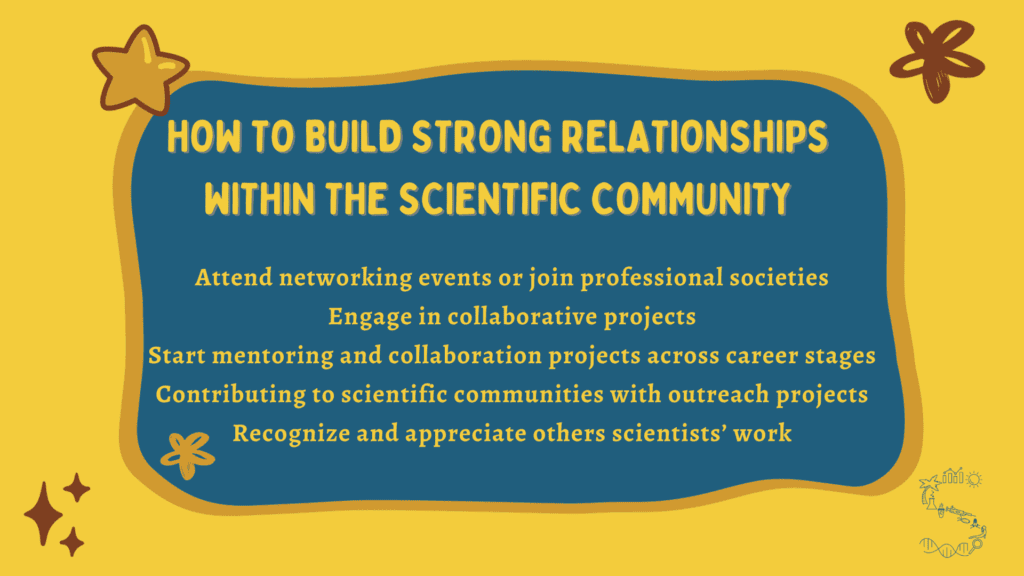
Grow and prosper as a scientist
As we have seen, effective communication and strong relationships can benefit your productivity as a scientist. Yet, the topic of loneliness within the scientific community is also present as I experienced it myself. The pressure to succeed, regular moves across countries, long hours spent in the lab and the competitive nature of scientific research can lead to feelings of isolation and loneliness.
Lack of social interaction and increased loneliness can negatively impact your well-being, motivation and research productivity. Therefore, I want to nudge you again to actively seek out opportunities for social interactions, to build relationships and foster a sense of belonging within the scientific community.
Here, we have discussed that effective communication and nurturing strong relationships play vital roles in your development as a scientist and in establishing yourself in the scientific community. By fostering open communication and building relationships, you can pave the way for breakthrough discoveries, scientific advancements and innovation.
Make yourself feel seen and heard by other scientists and become a relevant pillar in your own community. With a strong relationship network, you will see your personal growth, emotional well-being and happiness excel. Enjoy!
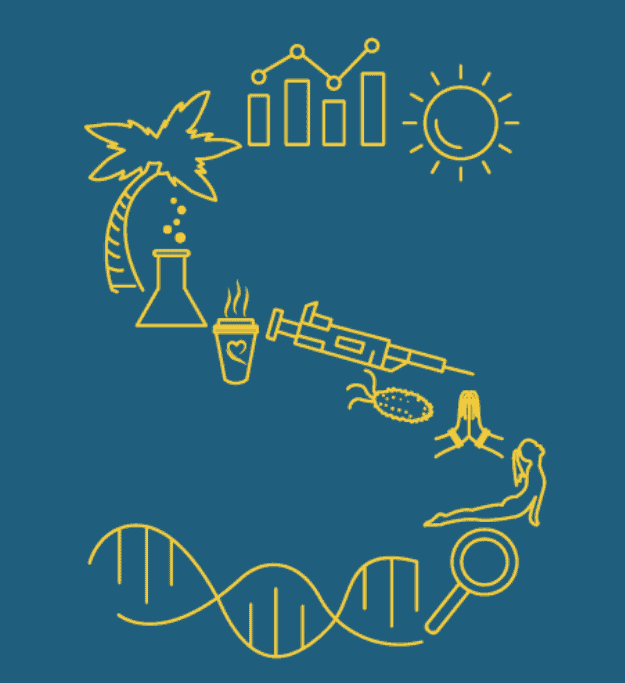
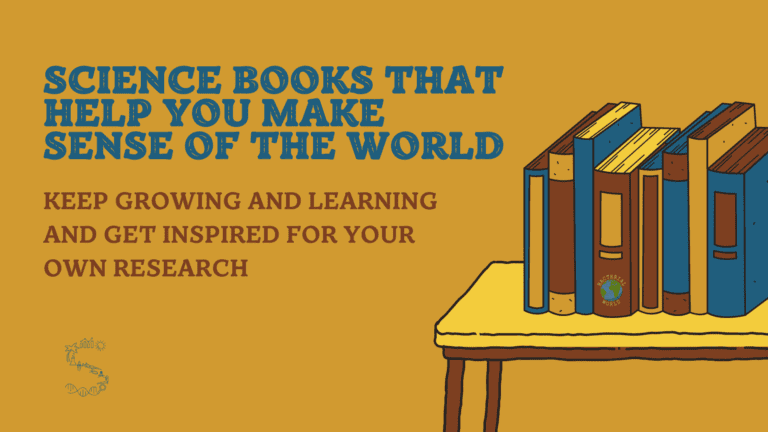
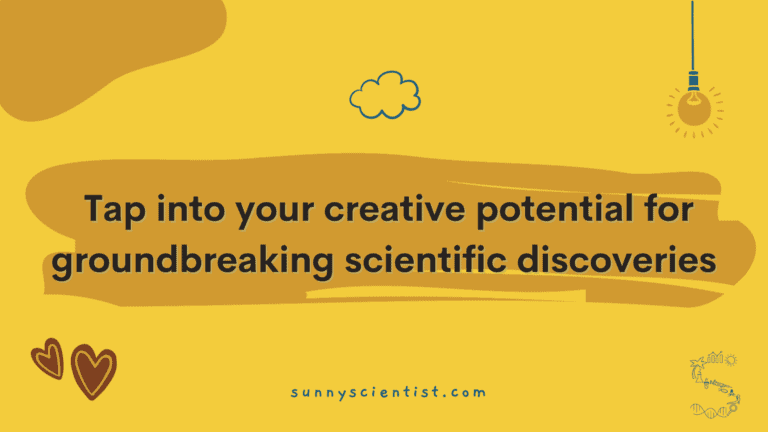
One Response